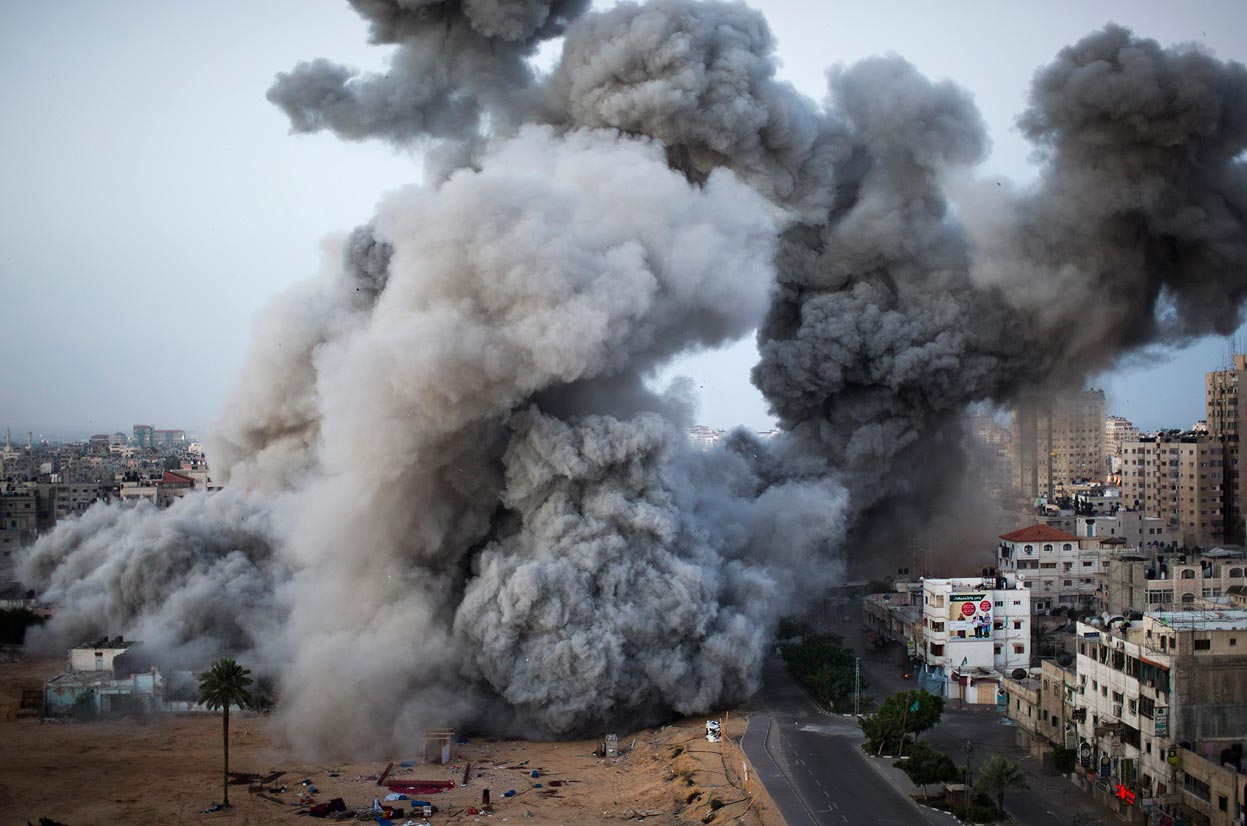An Associated Press video journalist and a freelance Palestinian translator working with him were killed Wednesday, August 13, 2014 when ordnance left over from Israeli-Hamas fighting exploded as they were reporting on the aftermath of the war in the Gaza Strip.
Simone Camilli and Ali Shehda Abu Afash died when an unexploded missile believed to have been dropped in an Israeli airstrike blew up as Gazan police engineers were working to neutralize it in the northern Gaza town of Beit Lahiya.
Police said three police engineers were also killed. Four people, including AP photographer Hatem Moussa, were badly injured.
Moussa told a colleague that they were filming the scene when an initial explosion went off. He said he was hit by shrapnel and began to run away when there was a second explosion. The blast knocked him unconscious and he woke up in a hospital. Moussa was later placed into surgery.
Camilli, an Italian national, had worked for The Associated Press since 2005, when he was hired in Rome. He relocated to Jerusalem in 2006, and often covered assignments in Gaza. In recent months, he had been based in Beirut, returning to Gaza after the war broke out last month.
He leaves behind a longtime partner and a 3-year-old daughter in Beirut, as well as his father, Pier Luigi, in Italy.
Camilli, 35, is the 33rd AP staffer to die in pursuit of the news since AP was founded in 1846, and the second this year. On Friday, April 4, 2014 AP photographer Anja Niedringhaus was killed and veteran AP correspondent Kathy Gannon was badly wounded by a gunman in Afghanistan.
He is the first foreign journalist killed in the Gaza conflict, which took more than 1,900 Palestinian lives and 67 on the Israeli side.
Abu Afash, a 36-year-old Gaza resident, leaves behind a wife and two daughters, ages 5 and 6. He often worked with the international media as a translator and news assistant.
“Simone was well known throughout Europe, and especially to our video team in London, where his death has hit AP deeply,” Gary Pruitt, the AP’s chief executive, said in a memo to staffers.
“As all of you know, this has been a very difficult year for AP,” he said. “As conflict and violence grows around the world, our work becomes more important but also more dangerous. We take every precaution we can to protect the brave journalists who staff our front lines. I never cease to be amazed at their courage,” he said. He said the AP was providing assistance to Camilli’s family.
Najib Jobain, the AP’s chief producer in Gaza, said Camilli was a welcome face in Gaza who loved the story so much that he recently turned down an assignment in Iraq to come to the seaside strip.
“He was my brother. I have known him for almost 10 years. He was so happy to be with me working in Gaza,” Jobain said. “He was asked, ‘Do you want to go to Irbil or Gaza?’ He said, ‘I’ll go to Gaza.'”
Diaa Hadid, a longtime colleague, said she arrived with Camilli in Jerusalem in 2006 and they became close friends. She described him as a “warm, lovely, funny, chain-smoking guy who could never find his own damned lighter, always up for a story and adventure kind of guy.”
“To think he is not here is really just too much,” she said.
Camilli began his career in Rome as an assistant during the illness of Pope John Paul II, while he was still a university student at the Sapienza University of Rome.
Over the years, he covered major stories across Europe and the Middle East, including the independence of Kosovo, the war in Georgia, the arrest of Bosnian Serb military leader Radko Mladic, the 2006 war between Israel and Lebanon, Hamas’ takeover of Gaza in 2007 and repeated rounds of fighting between Israel and the militant group, the resignation of Pope Benedict XVI. Most recently, he had covered the rise of the Islamic State in Iraq and the Syrian refugee crisis.
“From the moment he arrived in the Rome bureau he wanted to learn everything,” said Maria Grazia Murru, the AP’s senior producer in Rome. “He was passionate about wanting to tell people’s stories and wanted to be where the story was all the time. He wanted to learn everything and be the first, he was never happy waiting for images to happen. … I will miss his enthusiasm, his Roman accent and his smile.”
Chris Slaney, the former senior producer in Jerusalem, said he brought Camilli to Israel during the country’s war against Hezbollah in 2006.
“From that moment, he immersed himself in the Middle East story, which unfortunately is mostly a story of conflict,” Slaney said. He said Camilli was “passionately interested in art and music” and had run workshops for young Palestinian artists. “I shall miss him greatly on a personal and professional level.”
Tomislav Skaro, the AP’s Middle East regional editor for video, said Camilli was one of the AP’s “key videojournalists” in the region.
“His video had a signature, an incredible eye for detail and was able to personalize stories and portray human drama,” he said. “He was incredibly calm, mature beyond his age, gentle and the friend that everybody wants to have.”







